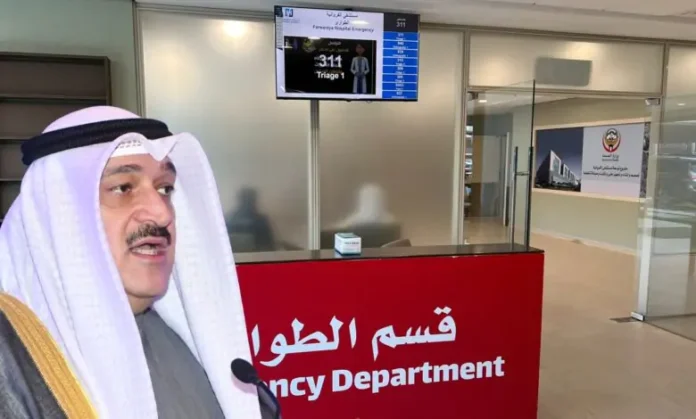On Wednesday, the Minister of Health, Dr. Ahmed Al-Awadhi, reaffirmed the Ministry’s commitment to staying at the forefront of scientific advancements, particularly in the realm of medical emergencies. Through the adoption of cutting-edge technologies, the Ministry aims to strengthen the healthcare system and ensure the delivery of high-quality medical services.
During his opening speech at the third conference of the Council of Emergency Medicine Departments, Minister Al-Awadhi emphasized the importance of the conference as a key platform for discussing the challenges and innovative solutions in emergency medicine. He highlighted that this essential sector plays a vital role in advancing both medical and academic services, fostering continuous improvement and excellence in healthcare delivery.
Minister Al-Awadhi elaborated on the conference’s significance as a reflection of Kuwait’s ongoing commitment to improving this crucial specialty within the health system. The focus remains on providing top-tier treatment methods and ensuring that medical personnel receive continuous training to maintain high levels of efficiency in emergency medical care.
The emergency sector is an integral part of Kuwait’s health system, standing at the frontline of critical cases and delivering life-saving care. Al-Awadhi pointed out that general emergency departments across the country manage approximately 2.5 million patient visits annually, underscoring the importance of the sector and the conference. The event brings together a distinguished group of experts to discuss scientific developments, address sector challenges, and chart a path forward for the future of emergency medicine.
Dr. Munira Al-Asfour, the head of the conference organizing committee, discussed the evolution of emergency medicine, noting that it has transformed from merely responding to urgent cases into a cornerstone of global healthcare systems. This progress is fueled by specialized academic programs, clinical research, and modern technologies that enhance the overall efficiency of emergency healthcare delivery.
Al-Asfour also highlighted the expanding scope of emergency medicine, which now includes sub-specialties such as immediate care, injury and accident management, crisis and disaster management, toxicology, pediatric emergencies, and even wildlife emergency medicine.
The conference’s extensive scientific program, lasting over 30 hours, is designed to provide emergency care providers with essential knowledge, best practices, and the latest developments in the field. By enhancing the skills of medical professionals, the program aims to elevate the quality of emergency services across healthcare facilities.
Reflecting on the growth of the Emergency Medicine Program, Al-Asfour noted that demand for specialized emergency physicians has skyrocketed, with the number of applicants for the program increasing more than tenfold. This surge is expected to help address the long-term shortage of emergency physicians with specialized certifications, further strengthening the country’s emergency healthcare capabilities.


